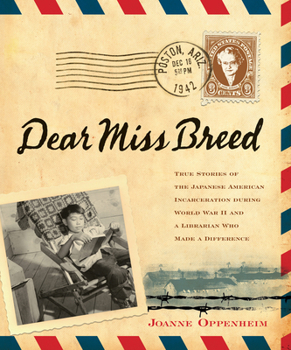Dear Miss Breed: True Stories of the Japanese American Incarceration During World War II and a Librarian Who Made a Difference
Select Format
Select Condition 
Book Overview
A chronicle of the incredible correspondence between California librarian Clara Breed and young Japanese American internees during World War II.In the early 1940's, Clara Breed was the children's librarian at the San Diego Public Library. But she was also friend to dozens of Japanese American children and teens when war broke out in December of 1941. The story of what happened to these American citizens is movingly told through letters that...
Format:Hardcover
Language:English
ISBN:0439569923
ISBN13:9780439569927
Release Date:February 2006
Publisher:Scholastic
Length:288 Pages
Weight:2.49 lbs.
Dimensions:0.9" x 8.7" x 10.6"
Age Range:12 to 17 years
Grade Range:Grades 7 to 12
Customer Reviews
4 ratings
A Vital Story Masterfully Told
Published by Thriftbooks.com User , 18 years ago
_Dear Miss Breed: True Stories of the Japanese American Incarceration During World War II and a Librarian Who Made a Difference_ by Joanne Oppenheim is the remarkable story of one woman who "fought injustice through the power of words and small, but constant, acts of kindness." In 1942 Clara Breed was the first children's librarian at the San Diego Public Library. She loved children, and she loved books. Most of all, she loved connecting the two. On April 1, 1942, Americans of Japanese ancestry, considered a threat to the security of the United States, were given one week to prepare for evacuation to an unknown site. They could take with them only what they could carry. They had to store, sell, or abandon the rest of their possessions. As Miss Breed said good-bye to her young patrons at the railroad station, she gave them stamped postcards addressed to herself so that they could write her when they reached their new home. Thus began correspondences that would see families through their short-term "home" (horse stalls at the Santa Anita racetrack) and their home for several years (the relocation camp in Poston, Arizona). Over the years Miss Breed sent the children books, Christmas and birthday gifts, treats, and requested items. Even more important, she showed the children and their families that she cared for them. She wrote articles about their treatment for _Library Journal_ and _Horn Book Magazine_, awakening teachers and other librarians to their plight. _Dear Miss Breed_ contains excerpts from the 200+ letters that Miss Breed received from the children between 1942 and 1945. Sadly, only one of the letters she had written could be found. However, the content of her letters can often be inferred from the children's letters. Oppenheim introduces the children with photographs and brief biographies. Then she begins an account that is basically chronological. Through primary sources such as drawings, cartoons, official notices, articles, and letters to the editor, she reveals the attitudes of that time. Through their letters the children present first-hand accounts of their experiences in the detention camps. The families inspire us with the optimism they demonstrate in the face of oppression. Excerpts from Oppenheim's interviews with the correspondents decades later and excerpts from testimony during CWRIC (Commission on Wartime Relocation and Internment of Civilians) hearings held in cities across the United States in 1981 provide the perspective that is possible only after time has elapsed. _Dear Miss Breed_ is masterfully told. The story is especially important as we find ourselves in the midst of another war when questions of detention and freedom are again an issue. Recommended for sixth grade and older, including adults.
Dear Miss Breed A must have for teachers
Published by Thriftbooks.com User , 18 years ago
This is an excellent resource for both English teachers and Social Science Teachers! This book is to Japanese Internment what The Diary of Ann Frank is to the Holocaust. It provides a first hand account of Internment without making you feel sorry for the Internees. It helps students and teachers to understand the impact of Internment on today's society. In reading this students and teachers will come to understand the deep seeded paranoia that swept over the nation and its impact on Civil liberties the effects which can be felt today.
What a great resource
Published by Thriftbooks.com User , 18 years ago
I was assigned to write a paper about the Japanese internment camps. Dear Miss Breed was the perfect resource for my paper. The author made history come to life. I can't imagine living through what those kids went through. It doesn't seem very american to me. The book is really easy to read and has great photographs and letters from the kids that wrote to Miss Breed. I'd recommend this book to anyone else assigned this subject.
An Amazing Book about an Amazing Woman
Published by Thriftbooks.com User , 18 years ago
What happens when America forgets her ideals and operates on fear, greed, and bigotry? In 1942, 120,000 Americans were put into prison camps just because the "looked like" the enemy. Joanne Oppenheim's fascinating account of the incarceration uses a unique perspective to give relevance to this stain on American history: the letters of the children who lived it. It turns out that Clara Breed, the children's librarian of San Diego, had entered into a correspondence with her young, incarcerated patrons and those letters are at the heart of this amazing read. The letters and books she sent to the children (and their informative responses) are at the heart of this documentary history, along with articles, photographs, cartoons, oral histories, and a wealth of other primary materials lovingly integrated by the author. Beyond a mere "history", the book is the story of how one person can make a difference - to history and to the lives of others.





